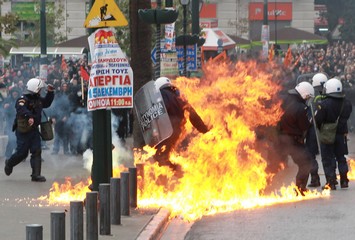by Mia Tahara-Stubbs | Leslie Shaffer, CNBC
With Greece‘s new government and euro zone finance ministers poles apart as bailout talks stalled late Monday, it’s come down to who blinks first, analysts said.
“Europe‘s going to back down. They’re going to give more concessions to Greece,” Destination Wealth CEO Michael Yoshikami told CNBC. “In the end, there’s going to be a new agreement, not just an extension, but a renegotiation.”
While its economy is just a small percentage of the eurozone’s gross domestic product (GDP), “Greece is too big to fail,” Yoshikami said, adding that’s why the market reaction has been muted.
After talks reached a stalemate, the euro faced heavy selling, dropping from over $1.14 on Monday to a low of around $1.1320 in early trade Tuesday, before bobbing back above to $1.1339.
Is Greece cornered?
If there’s no deal, Greece may “stand on its own feet” for a few weeks after the current program expires, Societe Generale said in a note Tuesday. “After that, the Greek government will need external financing or will default,” it said.
The country faces around 5.4 billion euros worth of bond redemptions and interest payments to the IMF and 1 billion euros in bond coupon payments in June, it noted.
“Whether or not the Greek government will stick to its guns is difficult to predict, but they seem increasingly cornered,” Societe Generale said.
No Plan B
Greece and Eurozone finance ministers have been locked in talks since the country’s newly elected anti-austerity government pledged to exit its 240 billion euro bailout package.
Read MoreEuropean markets end lower; Greece down 4%
But the Eurogroup talks in Brussels broke down early morning Asia time Tuesday, after the Greek government rejected a proposal that it request an extension to its existing international bailout package. Greece wants a temporary bridge loan while it renegotiates its debt burden.
“We want an honorable settlement,” the Finance Minister of Greece Yanis Varoufakis told the press after the talks broke down. “It’s not a bluff, because it’s the only option we have. It’s Plan A, there is no Plan B.”
Not everyone thinks an eventual deal will be in the offing.
The absence of any common ground between the two camps “suggest that even a short-term deal has not been reached at Monday’s Eurogroup finance ministers’ meeting, adding to risks that Greece may exit the euro-zone,” said Capital Economics’ Senior European Economist Jennifer McKewon in a note.
Others also see Grexit risks.
“Without a new program, the Greek government will eventually default while the ECB would most likely cut the Greek banks off from Eurosystem liquidity, triggering their collapse, increased private sector defaults and ultimately Grexit,” Societe Generale said. “We are not there yet, but time is running shorter by the minute.”
What next?
The deadline on the credit extension is Friday, but before that the European Central Bank will re-assess on Wednesday the Greek Emergency Liquidity Assistance.
The facility was extended earlier this month and has “helped offset concerns over the deposit flight from the Greek banking system. Any decision to cut-off ELA support will be negative for the markets and Greek financial system at large,” DBS Group said in a note Tuesday.
“They’re going to try to do everything they can to stop that because it is going to have a contagion effect and it’s going to move forward,” said Destination Wealth’s Yoshikami.
“If Greece’s banks collapse, what’s going to happen to Italy’s banks, what’s going to happen to Spain’s banks, what’s going to happen to Portugal’s banks,” he said. “I just don’t think they want to go down that road.”



















